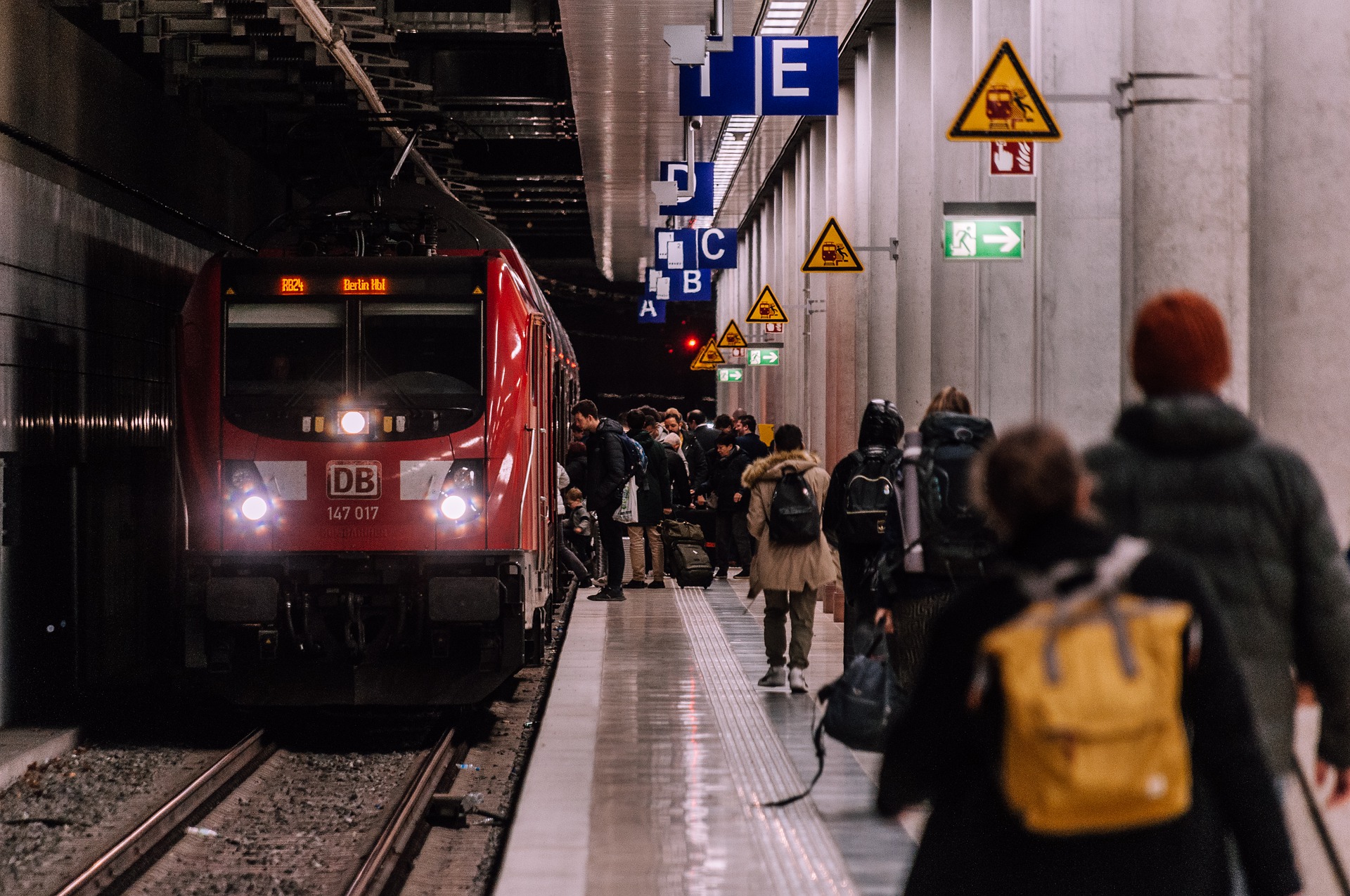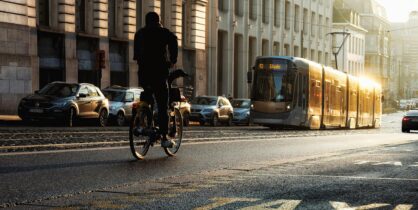I Took the Night Train from Brussels to Berlin
A brief analysis of trains’ impact on the environment and implementing reasonable sustainable mobility solutions.
“Come to Berlin,” my friend Diego messaged me one day.
It was a week until his birthday and he wanted to spend it celebrating in the abandoned airport-turned-park Tempelhofer Feld, weather permitting (it did not). I had not been in Germany for ages.
Before moving to Belgium last year, I had promised between tears and goodbye kisses that I would visit lots, but of course in reality only made it back twice for weekend trips that felt too short. I knew it would be a shame to pass up such an invitation. I missed laughing and discussing stupid politics with old friends from university and the taste of Club Mate with vegetarian döner.
I wanted to celebrate too! Was it possible? I turned to my oracle.
Scrolling Google results of alternative modes of transport, I stopped at the idea of the Nightjet, a sleeper train. It was expensive, but practical and fit my chaotic schedule. I weighed my options. I would rather eat glass than go to Charleroi. On the other hand, I had lovely memories of being a student in Russia and taking the night train back to St Petersburg from an excursion in the Arctic.
The twenty-seven hours emerging from the polar night were spent by the window, watching the tundra go by, or in the bright green dining car, listening to the Soviet disco played over the speakers and making friends with my cabin-mates.
An adventurous spirit possessed me. I booked the ticket.
Railway renaissance
The Nightjet rail service is run by the ÖBB, the Austrian transit company, and their Brussels-Berlin line goes three times a week: on Monday, Wednesday, and Friday. The distance is 1053 kilometers, which takes 13, 14, or 15 hours to cover depending on the stops, usually departing from Gare du Midi at 7pm and arriving at the Hauptbahnhof from 8 to 10 am. Not bad.
Tickets are sold in three tiers associated with varying levels of comfort and price tags. The seating carriage, as it sounds, requires its passengers to be in an upright position like on an airplane, and is by far the cheapest option coming in at around 40 euros. The second option, the couchette carriage, with full beds and breakfast included, costs 70 euros (or about €100 when it’s last minute like mine was).

The sleeper cabin is the more luxurious version, spacious and including a private WC with a shower and ranging from 90 to 134 euros. Like a hostel on wheels, “ladies’ compartments” are available at no extra cost.
Sliding open the doors to my compartment, I was greeted with an outdated but functional little cabin. The two couches on either side could be flipped into two beds with some easy adjustments. An attendant with beads of sweat on his forehead came by, speaking quickly in a German accented by the Austrian mountains and taking personal breakfast orders.
Unfortunately, there was no dining car on this train (although upon further research they do exist on other night trains connections with other operators). My Euro disco dreams were dashed. Still, it was hard not to feel excited before the train left the station. The atmosphere was social, and it seemed like it was everyone’s first time on a train. A long journey ahead, us passengers made ourselves comfortable.
Within five or ten minutes of finding their cabin, the crew of six friends with heavy backpacks were laughing and sharing beers. The Flemish woman in the cabin next door and I were in the hallway. We had both already taken off our shoes, and spoke to each other in socks, speaking a half-German half-Dutch as unusual as the situation. She was taking pictures of her home for the night with her phone. “I just have to,” she said to me. “Isn’t it so much fun?”
Since 2021 (the official “European Year of Rail”), night trains have begun to have a resurgence, expanding across the continent.
We are in the midst of the railway renaissance; for the past few years it seems as if night trains have been making a comeback. Due to the rise of budget airlines, they were steadily in decline, experienced by my generation really only through the stories told by our parents about their interrail summers in the 80s.
However, this has changed, and since 2021 (the official “European Year of Rail”), night trains have begun to have a resurgence, expanding across the continent. Passengers can book from a variety of operators from Munich to Zagreb, Rome to Pompeii, Amsterdam to Barcelona.
The sustainable option
Night travel offers a more climate-friendly way to traverse the continent, as the use of transportation services in our globalized world increases. Long-distance, night trains compete with planes, and shorter distances with cars. In both cases, rail is more carbon-efficient.
According to back-on-track.eu, a website developed by train enthusiasts (who have been right all along, I am realizing. Justice for trainspotters) to map out night train journeys, night trains have on EU average a climate impact 28 times lower than air travel in terms of greenhouse gas (GHG) emissions. My booking to Berlin came with a little note that said I saved 224.6 kilograms of CO₂ compared to the same distance taken as a roadtrip.

A vibrant interconnected web of night connections between European countries could also change the social habits of people and incentivize more travel by rail in general. Imagine the establishment of a railway between the island of Ireland and the rest of the continent. The pollution caused by popular journeys by air – between Dublin and London, for example – could be vastly reduced. Irish citizens would finally be empowered to make environmentally conscious decisions, an option which they currently do not have.
Night travel offers a more climate-friendly way to traverse the continent, as the use of transportation services in our globalized world increases.
Still, it is not easy to compete with low-cost flights. Even considering check-in and security, taking a flight from Charleroi on a budget line would have taken me less time to reach Berlin, and prices on seasonal discounts can reach the single digits. Such convenience and affordability are incredibly attractive to young travelers who have started to think that waking up at strange hours or wearing all their clothes at once to avoid baggage fees is just what traveling is.
A Transport & Environment (T&E) report published in 2023 illustrates how member states could easily lower the price of night train tickets through policy measures. They cite a study which found that a large majority of those in Germany, Poland, France, Spain, and the Netherlands would be willing to use night trains, but that 73% of respondents think that rail travel on the same route should generally be cheaper than air travel, so making such travel more accessible to the public is of major interest to train operators.
Tickets on night trains are more expensive for compounding reasons, but especially because of the liberalization of the transit system in Europe, and the lack of a level playing field between modes of transport. There are several bureaucratic and structural challenges to overcome in the industry.

Night trains are costly to own: they can only run at night, carry less passengers, and must pay tolls (TAC, or track access charges) to get from A to B. In comparison, cars do not have such an obligation to be permitted use EU roads, they just drive relatively unregulated.
Policy recommendations set forth by T&E and other climate-oriented organizations include the elimination of the TAC tax, and harsher control of aviation, especially implementing a tax on kerosene. Taxation of commercial aviation fuel is currently prohibited worldwide, although it remains a massive source of pollution.
Making European airlines pay for their intense environmental impact could have a positive influence globally. Such changes could also take the steps needed to make night train travel more affordable and accessible for travellers.
The case for making life more fun
Back on the train to Berlin, the motion helped me fall asleep quickly, and I woke up to my alarm to see the sunrise. Sharing a breakfast of bread, jam, and hot tea as the European countryside rushed past, I felt that this experience was not just an interval, lost or wasted time, but as much a part of my holiday as seeing my old friends, or exploring the city.
Night trains and their sleeper cars have an air of excitement to them, alluding to mysteries from a bygone era. Frequented by artists, writers, spies, night trains have a certain sort of status as a literary and cultural setting of adventures, the epitome of the bohemian movement. The Orient Express and Trans-Siberian Railway are legendary. Has a budget airline ever been described as anything even close to that?
Night trains and their sleeper cars have an air of excitement to them, alluding to mysteries from a bygone era.
Combining travel and accommodation, night trains could save both time and money if properly supported by the Member States. They are worth investing in for their potential contribution to reducing carbon emissions and mitigating climate change.
Europe has the opportunity to usher in a new era of mobility, to capitalize on the mystique and adventure of travel by night. The most climate-friendly mode of travel could be the main one.
Looking for other mobility-focused articles? Read Europe by Rail or The Unseen Impact of Patriarchal Mobility.
